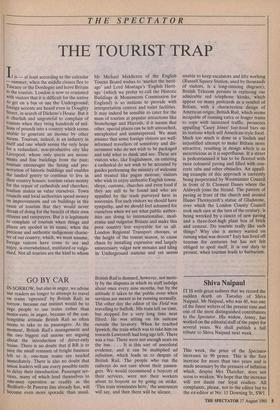GO BY CAR
IN SORROW, but also in anger, we advise our readers no longer to attempt to travel on trains `operated' by British Rail: in sorrow, because our instinct would be to Urge people to use trains rather than motor-cars; in anger, because of the con- temptible attitude British Rail so often seems to take to its passengers. At the Moment, British Rail's management and the two biggest rail unions are arguing about the introduction of driver-only trains. There is no doubt that if BR is to save the small remnant of freight business left to it, one-man trains are needed immediately. There is also no doubt that union leaders will use every possible tactic to delay their introduction. Passenger ser- vices, many of which lend themselves to one-man operation as readily as the Bedford—St Pancras line already has, will become even more sporadic than usual. British Rail is damned, however, not mere- ly by the disputes in which its staff indulge about once every nine months, but by the attitude it takes to the public even when services are meant to be running normally. The other day the editor of the Field was travelling to Suffolk. His train left on time, but stopped for a very long time near Ilford. He was sitting on his suitcase outside the lavatory. When he reached Ipswich, the train which was to take him on towards Lowestoft had long ago left. There was a bus. There were not enough seats on the bus. . . . It is this sort of anecdotal evidence, and it can be multiplied ad infinitum, which leads us to despair of British Rail. The people who run the railways do not care about their passen- gers. We would recommend a boycott of their services, were not their workers about to boycott us by going on strike. `This train terminates here,' the announcer will say, and then there will be silence.














































 Previous page
Previous page